Allen Toussaint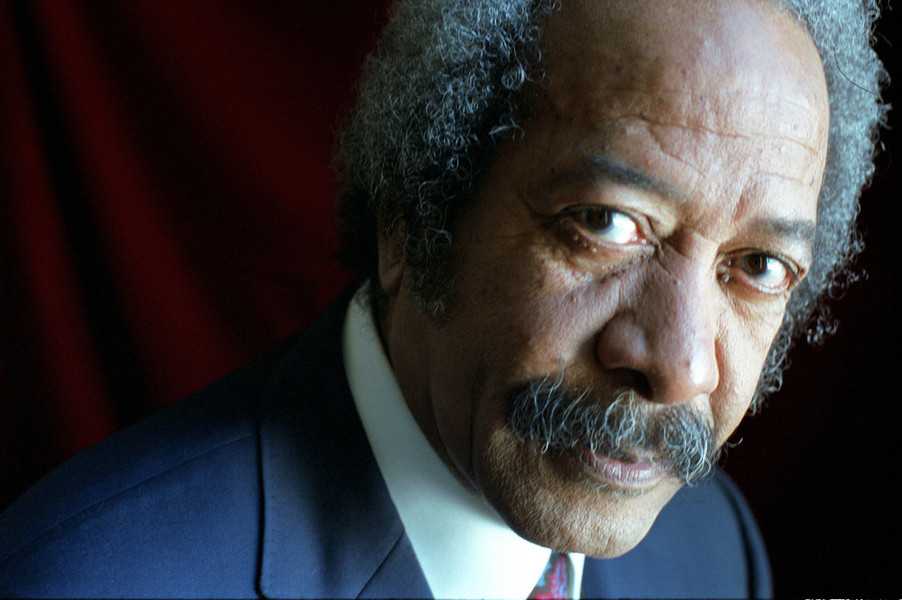 | ||
| Allmusic Biography : Producer, songwriter, arranger, session pianist, solo artist -- Allen Toussaint wore all these hats over the course of his lengthy and prolific career, and his behind-the-scenes work alone would have been enough to make him a legend of New Orleans R&B.; Thanks to his work with numerous other artists, Toussaint bore an enormous amount of responsibility for the sound of R&B; in the Crescent City from the 60s on into the 70s. His productions kept with the times, moving from rollicking, earthy soul in the 60s to gritty, rambunctious funk in the 70s. As a composer, Toussaint proved himself a consistent hitmaker, penning more than a few gems that have since become R&B; standards and been covered by countless artists working in many different styles. In keeping with that across-the-board appeal, Toussaint worked in some supporting capacity for a wide variety of rock and blues legends, particularly from the 70s on. On top of all that, Toussaint waxed his own records from time to time, enjoying a creative peak in the 70s with several albums that highlighted his laid-back vocals and elegantly funky piano work. Even if he wasnt always the most visible figure, Toussaints contributions to New Orleans music -- and to rock & roll in general -- were such that he earned induction into the Rock and Roll Hall of Fame in 1998. Toussaint was born January 14, 1938, in New Orleans, and began learning piano at age seven, inspired by Professor Longhair; his style later grew to include elements of Fats Domino, Huey "Piano" Smith, and Ray Charles. As a teenager, he played in a band called the Flamingoes with bluesman Snooks Eaglin. Toussaint caught his first professional break at age 17, when Earl King tapped him to fill in for Smith at a live gig. Not long after, famed producer/songwriter Dave Bartholomew -- whose role in New Orleans R&B; during the 50s was fairly analogous to Toussaints later career -- hired him to lay down the piano parts at a Fats Domino recording session for which Domino himself was unavailable. Bartholomew made regular use of Toussaint, most notably on further sessions for Domino and Smiley Lewis, and demand for the young pianists services grew quickly, especially after he first displayed his talent as an arranger on saxman Lee Allens biggest hit, "Walkin with Mr. Lee." In 1958, Toussaint recorded an instrumental album for RCA called The Wild Sound of New Orleans, under the alias Tousan; one of his original compositions for the record, "Java," went on to become a smash hit for Dixieland jazz trumpeter Al Hirt five years later. Toussaint also began writing under the pseudonym Naomi Neville, after his mothers maiden name. In 1960, Toussaint was hired by Joe Banashak as an A&R; man for the brand-new Minit label; in practice, he wound up masterminding most of the labels recording sessions. It was here that Toussaint truly began to build his legend. His first national success as a producer came with Jessie Hills R&B; Top Five smash "Ooh Poo Pah Doo" in 1960, and the classic hits came fast and furious after that: Ernie K-Does pop and R&B; number one "Mother-in-Law" (a Toussaint composition), Benny Spellmans "Fortune Teller," and "Lipstick Traces (On a Cigarette)" (both Toussaint tunes written as Naomi Neville, with the former later covered by the Rolling Stones), Chris Kenners original version of "Land of 1000 Dances," Lee Dorseys "Ya Ya," and numerous sides with New Orleans soul queen Irma Thomas. Toussaints singular touch on all these records redefined the sound of New Orleans R&B; for a new decade. When Banashak left Minit to found another label, Instant, Toussaint went with him to fulfill much the same duties; he also freelanced elsewhere, most prominently with Dorseys recordings for the Fury label, and cut a few low-profile singles of his own, mostly for Seville. In 1963, Toussaint was drafted into the military, during which time he recorded with his backing band the Stokes while on leave; one of their tunes, the Naomi Neville credit "Whipped Cream," was covered by Herb Alpert in 1965 for an instrumental hit, which was in turn later adopted as the theme for TVs The Dating Game. Upon his discharge in 1965, Toussaint teamed up with fellow producer Marshall Sehorn to form a production company and record label, Sansu Enterprises. Sansu recorded the likes of Betty Harris, Earl King, Chris Kenner, and Lou Johnson, among others, often leasing their singles to larger labels for official release. Their most profitable association was with Lee Dorsey, who returned to the upper reaches of the R&B; charts with Toussaint-penned hits like "Ride Your Pony," the oft-covered "Get Out of My Life Woman," the immortal "Working in a Coalmine," and "Everything I Do Gonh Be Funky (From Now On)" (covered by jazzman Lou Donaldson). In 1966, Sansu also engaged the services of a house band dubbed the Meters, who supplied backing for nearly all of the companys productions; after the Meters started making their own records in 1969 (produced by Toussaint), they developed into arguably the top instrumental funk ensemble of the 70s outside of the J.B.s. In 1971, Toussaint recorded his first solo album in over a decade for Scepter, calling it simply Toussaint (it was later reissued in the U.K. as From a Whisper to a Scream, after its best-known track). The following year, he moved up to Reprise for Life, Love and Faith, and he and Sehorn opened a state-of-the-art recording studio in New Orleans called Sea-Saint, which became the site for most of his subsequent projects. In addition to his solo records, Toussaint was getting more high-profile offers for outside work during the first half of the 70s. He did horn arrangements for the Band, Paul Simon, Little Feat, and Sandy Denny, and his continued work with the Meters was moving him into contemporary funk with a harder edge than his own albums. In fact, he wound up producing two of New Orleans greatest funk records: Dr. Johns Top Ten hit "Right Place, Wrong Time" and LaBelles number one disco-funk smash "Lady Marmalade." In 1975, Toussaint released what many regarded as his finest solo album, Southern Nights; the title track went on to become a huge hit for country-pop superstar Glen Campbell, and "What Do You Want the Girl to Do?" was covered by Boz Scaggs, Lowell George, and Bonnie Raitt. In 1976, Toussaint produced the Meters-related group the Wild Tchoupitoulas, whose self-titled debut was hailed as a classic of New Orleans funk. The records experimentalism signaled a growing desire to branch out in the Meters camp, though, which would soon cause the bands split with Toussaint and, eventually, each other. The absence of their unerring sense of groove was noticeable on Toussaints final solo LP for quite some time, 1978s Motion. Toussaints activities tailed off in the years that followed; he still produced, arranged, and played piano on selected projects, which included albums by blues artists Etta James and Albert King, and rockers Elvis Costello and Joe Cocker, among others. In the meantime, his extensive song catalog was still mined regularly for cover material; the Lee Dorsey period was the most fertile, not just for "Working in a Coalmine" (Devo, the Judds), but lesser-known items like "Yes We Can" (the Pointer Sisters), "Sneakin Sally Through the Alley" (Robert Palmer), and "Freedom for the Stallion" (the Oak Ridge Boys, among others). In addition, "Play Something Sweet (Brickyard Blues)" was a hit for Three Dog Night, and Bonnie Raitt cut a well-received version of "What Is Success." The Allen Toussaint Collection, a fine overview of his major-label recordings in the 70s, was released in 1991. In 1996, Toussaint formed a new label, NYNO, and recorded a full album of new material at his Sea-Saint studio titled Connected. Toussaint also began recording newer Crescent City artists in hopes of preserving the classic New Orleans sound. He was inducted into the Rock & Roll Hall of Fame in 1998 in the non-performer category. Going Places, attributed to Allen Toussaints Jazzity Project, appeared in 2005, followed by the Joe Henry-produced The Bright Mississippi from Nonesuch Records in 2009. Four years later, the solo live album Songbook -- its performances dating from 2006 -- appeared on Rounder. Although Toussaint continued to perform, Songbook was the last album he released; he died in Madrid on November 10, 2015 while touring. A few weeks prior to his passing, Toussaint reunited with Joe Henry to cut material for a new record. Those recordings, combined with some solo 2013 sessions, were packaged as the posthumous American Tunes, released in June of 2016. | ||
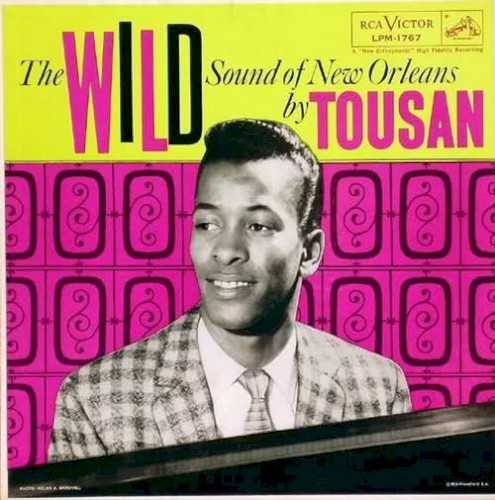 | Album: 1 of 16 Title: The Wild Sound of New Orleans Released: 1958 Tracks: 12 Duration: 25:31 Scroll: Up Down Top Bottom 25% 50% 75% Allmusic AlbumCover | 1 Whirlaway (02:22) 2 Up the Creek (01:51) 3 Tim Tam (02:00) 4 Me and You (02:08) 5 Bono (02:08) 6 Java (01:53) 7 Happy Times (02:07) 8 Wham Tousan (02:24) 9 Nowhere to Go (01:44) 10 Nashua (02:35) 11 Po Boy Walk (02:35) 12 Pelican Parade (01:40) |
| The Wild Sound of New Orleans : Allmusic album Review : These dozen sides represent Allen Toussaints earliest solo recordings for RCA Records circa 1958. Toussaint was essentially discovered by Danny Kessler -- an early version of what would now be considered an A&R; man. It was during another artists studio time -- featuring Toussaint as the accompanying pianist -- that Kessler first heard and approached Toussaint to prepare a few instrumentals of his own. On January 29, 1958, Toussaint (piano) was joined by a local crew that included Alvin "Red" Taylor (baritone sax), Nat Perrilliat (tenor sax) or Lee Allen (tenor sax), either Justin Adams (guitar) or Roy Montrell (guitar), Frank Fields (bass), and Charles "Hungry" Williams (drums). As intimated above, the precise personnel has long been debated. Kessler produced an outing that yielded the infectiously up-tempo blues "Whirlaway" and the Ray Charles-inspired gospel-meets-barrelhouse-meets-swing title "Happy Times." Kessler turned the pair into a locally successful single and was so encouraged by the results, less than a month later the same assemblage gathered to record the remainder of what would be the Wild Sound of New Orleans (1958). The soulful "Up the Creek" is a dark waltz with Toussaints stirring keyboard runs emphasizing the haunting refrain. On the opposite side of the emotive spectrum, the hearty "Tim Tam" is impelled by Williams hard and heavy backbeat with Allen blowing his lungs out. Another contrast follows with the whimsical "Me and You." The melody is decked out with a classy early 20th century pop standard feel, while all the more striking is the percussive accompaniment replicating a tap-dancer doing an old soft shoe. Immediately, Toussaints expressive keyboarding on "Bono" and "Nashua" give props to the performance style of Professor Longhair before settling into their respectively catchy, mid-tempo rhythms. The horns have plenty of room to strut their proverbial stuff and the syncopation of the latter immediately brings Mardi Gras to mind. Perhaps the best-known tune among the lot is the jaunty "Java," which took on new life thanks to a chart-topping remake by Al Hirt. The trumpeter turned it into his unofficial theme song, ultimately making a 30-plus-year career out of it. "Wham Tousan" and "Pelican Parade" each quickly rev up to full throttle with the saxes taking on and going head-to-head with Toussaints rollicking runs up and down the 88s. The German-label import Complete "Tousan" Sessions (1992) from Bear Family is a good way to get the 12 songs found here. It also boasts the complete and rarer Seville label material that the artist cut and issued under the moniker "Al Tousan." | ||
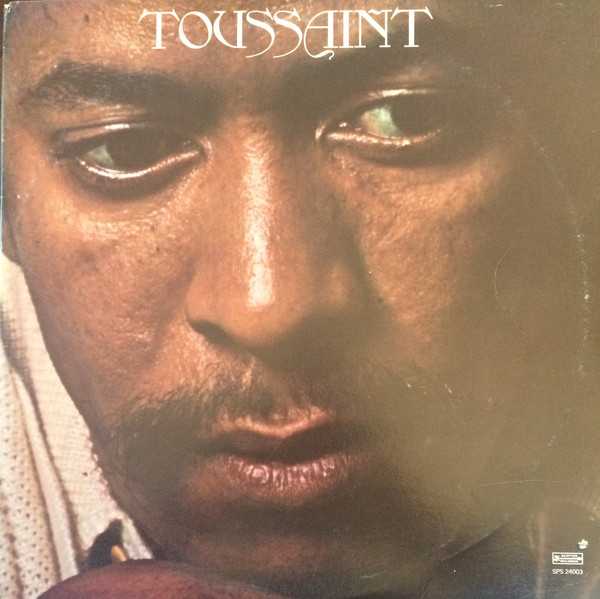 | Album: 2 of 16 Title: Toussaint Released: 1970 Tracks: 10 Duration: 33:49 Scroll: Up Down Top Bottom 25% 50% 75% Spotify Wikipedia AlbumCover | 1 From a Whisper to a Scream (03:28) 2 Chokin Kind (03:25) 3 Sweet Touch of Love (03:16) 4 What is Success (03:33) 5 Working in the Coal Mine (03:11) 6 Everything I Do Gonna Be Funky (03:09) 7 Pickles (04:28) 8 Louie (03:03) 9 Either (02:53) 10 Cast Your Fate to the Wind (03:19) |
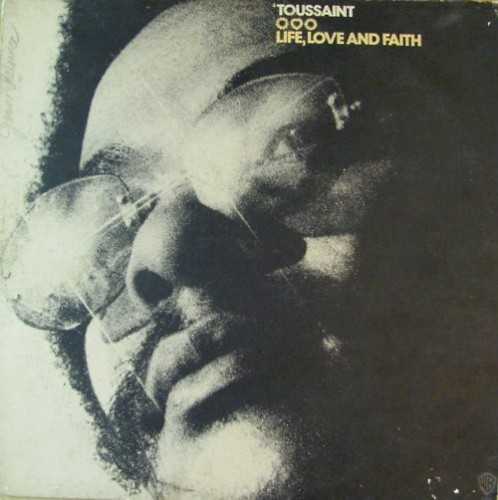 | Album: 3 of 16 Title: Life, Love and Faith Released: 1972 Tracks: 12 Duration: 38:16 Scroll: Up Down Top Bottom 25% 50% 75% Spotify Allmusic AlbumCover | 1 Victims of the Darkness (03:30) 2 Am I Expecting Too Much? (02:47) 3 My Baby Is the Real Thing (03:05) 4 Goin Down (02:55) 5 She Once Belonged to Me (02:51) 6 Out of the City (Into Country Life) (03:36) 7 Soul Sister (02:48) 8 Fingers and Toes (04:05) 9 Ive Got to Convince Myself (02:41) 10 On Your Way Down (04:00) 11 Gone Too Far (03:26) 12 Electricity (02:28) |
| Life, Love and Faith : Allmusic album Review : When Allen Toussaint restarted his solo career in 1970 with Toussaint (aka From a Whisper to a Scream), he leaned heavily on songs he had written for other artists, as well as a couple of covers. It was a good way to jump-start his career, and with its elastic, elegant arrangements, it set the groundwork for 1972s Life, Love and Faith, his first album for Reprise/Warner. Toussaint seized the opportunity as a way to stretch out his sound, refining it and expanding it so it was grounded in New Orleans R&B; but also encompassed hard funk and smooth soul. Though it was a soul album through and through, it also had the feeling of being part of Reprises considerable singer/songwriter stable -- such artists as Randy Newman, Bonnie Raitt, Little Feat, and Joni Mitchell -- and if anything, Life, Love and Faith feels more of a piece with this group than it does with most music coming out of New Orleans in the early 70s because it also captures an eccentric genius pursuing his idiosyncratic vision. Here, it seems as if Toussaint has found every permutation of his signature sound, which is pretty much the sound of New Orleans R&B.; He revives the classic, easy-rolling groove on "Soul Sister"; turns it seriously, deeply funky on "Goin Down" and "Victims of the Darkness"; gets trippy on "Out of the City (Into Country Life)"; treads nimbly with a Philly soul variation on "She Once Belonged to Me"; and crafts a tremendous, dramatic ballad with "On Your Way Down," one of the finest songs he ever wrote. Its a textured, multi-layered record that may not be the purest dose of Toussaint, but is the one album that truly exhibits how deep and wide his talents ran. | ||
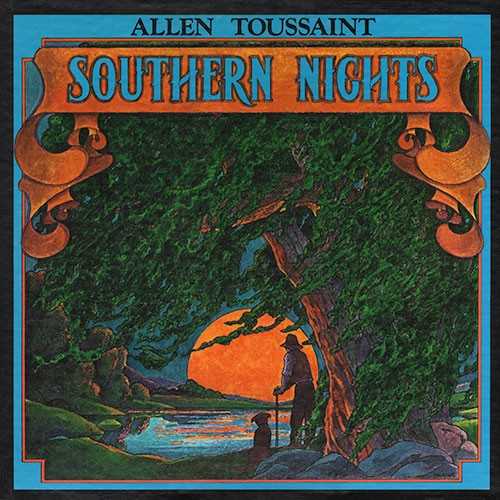 | Album: 4 of 16 Title: Southern Nights Released: 1975 Tracks: 10 Duration: 35:26 Scroll: Up Down Top Bottom 25% 50% 75% Spotify TrackSamples Allmusic Wikipedia AlbumCover | 1 Last Train (02:59) 2 Worldwide (02:42) 3 Back in Babys Arms (04:45) 4 Country John (04:45) 5 Basic Lady (02:57) 6 Southern Nights (03:35) 7 You Will Not Lose (03:41) 8 What Do You Want the Girl to Do? (03:36) 9 When the Partys Over (02:33) 10 Cruel Way to Go Down (03:52) |
| Southern Nights : Allmusic album Review : Allen Toussaint produced a kind of masterpiece with his first Reprise album, Life, Love and Faith, finding previously unimagined variations on his signature New Orleans R&B; sound. For its 1975 sequel, Southern Nights, he went even further out, working with producer Marshall Sehorn to create a hazy vague concept album that flirted with neo-psychedelia while dishing out his deepest funk and sweetest soul. Its a bit of an unfocused album, but thats largely due to the repeated instrumental "filler," usually based on the theme of the title song, that pops up between every two or so songs, undercutting whatever momentum the album is building. That, along with a song or two that are merely average Toussaint, prevents Southern Nights from being a full-fledged masterpiece, but it comes close enough to that level of distinction anyway due to the brilliance of its best songs. There is, of course, "Southern Nights," which Glen Campbell later took to the top of the charts, but its nearly unrecognizable here, given a swirling, trippy arrangement that plays like a heat mirage. Its rivalled by the exquisite "What Do You Want the Girl to Do?," later covered by both Bonnie Raitt and Boz Scaggs, neither of which equal the beautiful, sighing resignation of Toussaints impeccable vocal performance. Then, there are the songs that werent covered, but should have been, like the nearly anthemic "Back in Babys Arm," the rolling, catchy "Basic Lady," the stately "You Will Not Lose," or the steady-grooving end-of-the-night "When the Partys Over." Then, there are the songs that perhaps only Toussaint could sing, given their complex yet nimble grooves: witness how "Country John" seems like a simple, straight-ahead New Orleans raver but really switches tempo and rhythm over the course of the song, or how the monumental "Last Train" builds from its spare, funky opening to a multi-layered conclusion boasting one of Toussaints best horn arrangements and vocal hooks. These disparate sounds may not be tied together by the interludes, as they were intended, but they nevertheless hold together because theyre strong songs all bearing Toussaints unmistakable imprint. Theyre so good that they nearly knock the "near" of off the near-masterpiece status for Southern Nights, and theyre the reason why the album should be a part of any serious soul collection. | ||
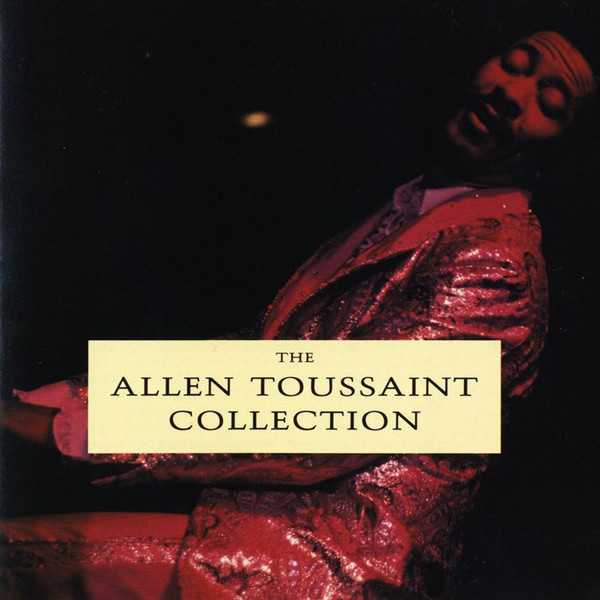 | Album: 5 of 16 Title: The Allen Toussaint Collection Released: 1991-04-30 Tracks: 16 Duration: 58:24 Scroll: Up Down Top Bottom 25% 50% 75% Spotify AlbumCover | 1 From a Whisper to a Scream (03:27) 2 What Is Success (03:33) 3 Am I Expecting Too Much (02:51) 4 On Your Way Down (04:01) 5 Soul Sister (02:50) 6 Country John (03:35) 7 Last Train (03:02) 8 Southern Nights (03:37) 9 What Do You Want the Girl to Do (03:40) 10 You Will Not Lose (03:27) 11 Night People (04:16) 12 Lover of Love (03:17) 13 Motion (06:02) 14 Viva La Money (03:33) 15 Happiness (03:26) 16 With You in Mind (03:42) |
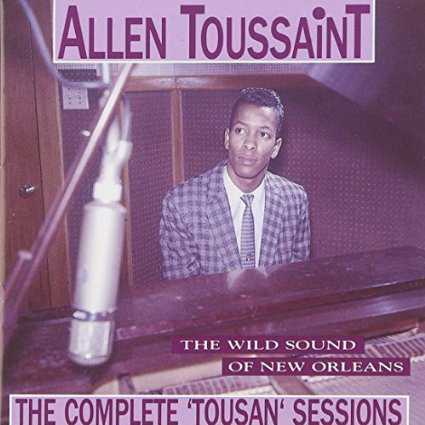 | Album: 6 of 16 Title: The Complete "Tousan" Sessions Released: 1992 Tracks: 27 Duration: 1:04:04 Scroll: Up Down Top Bottom 25% 50% 75% Allmusic AlbumCover | 1 Whirlaway (02:20) 2 Happy Times (02:09) 3 Up the Creek (01:51) 4 Tim Tam (02:01) 5 Me and You (02:09) 6 Bono (02:07) 7 Java (01:55) 8 Wham Tousan (02:24) 9 Nowhere to Go (01:44) 10 Nashua (02:34) 11 Po Boy Walk (02:34) 12 Pelican Parade (01:45) 13 Chico (02:19) 14 Back Home Again in Indiana (02:41) 15 Second Liner (02:35) 16 Cow Cow Blues (02:48) 17 Moo Moo (03:55) 18 Sweettle Pie (Twenty Years Later) (02:24) 19 You Didnt Know, Did You (02:18) 20 Up Right (02:14) 21 A Blue Mood (02:25) 22 A Lazy Day (without Organ) (02:20) 23 Naomi (02:32) 24 Als Theme (01:57) 25 Real Churchy (without Organ) (03:05) 26 A Lazy Day (with Organ) (02:30) 27 Real Churchy (with Organ) (02:28) |
| The Complete "Tousan" Sessions : Allmusic album Review : From the German-based Bear Family Records reissue label comes over two-dozen selections by a young Allen Toussaint (piano) during his earliest outings as a solo artist -- albeit under the slightly truncated nom de plume of "A. Tousan" or simply "Tousan." Although hed been gigging and sitting in on a variety of Crescent City R&B; sessions, it was RCA Records Danny Kessler who took the initiative to book studio time for Toussaint. That very first endeavor -- held on January 29, 1958 -- featured Toussaint supported by other Nola locals Alvin "Red" Taylor (baritone sax), Nat Perrilliat (tenor sax), or Lee Allen (tenor sax), either Justin Adams (guitar) or Roy Montrell (guitar), Frank Fields (bass), and Charles "Hungry" Williams (drums). While the exact lineup may not be certain, what is undeniable is the masterful energy of these seminal sides. Toussaint revealed to a reviewer that he "had no involvement in the titles of the songs. When I played them, I referred to them as Song Number One, Song Number Two and so on. It wasnt until the record came out that I was informed Kessler had chosen to name each piece after a different racehorse." Once "Whirlaway" b/w the raucous sacred-inspired "Happy Times" scored favorable results, Kessler hit Toussaint up for enough material to compile what would become the full-length Wild Sound of New Orleans (1958) LP. Arguably the best-known of the instrumental lot is the perky "Java" -- which Al Hirt (trumpet) was able to take to the top of the pop singles survey, not to mention carve out a nice career for himself in the process. Other entries worthy of multiple spins include the mile-a-minute "Tim Tam," "Bono," and the musical Mardi Gras that is "Nashua" -- which owes much to Professor Longhair and points the way for Toussaints future musical aspirations. Similarly, "Wham Tousan" and "Pelican Parade" are evidence of Toussaints already fully formed keyboard style. The second half of the Complete "Tousan" Sessions (1992) is dedicated to tracks destined for the Seville imprint and credited to "Al Tousan and His Piano." Of the 15 tunes documented during the December 7 and 8, 1959 session only a handful were ever released. Namely, the 45s "Chico" b/w "Sweetie Pie," "Naomi" b/w "Back Home Again in Indiana" -- a rare cover tune for Toussaint, "A Blue Mood" b/w "Moo Moo" (aka "Cow Cow Boogie"), and "Real Churchy" b/w "Twenty Years Later." Interestingly, the latter is nothing more than a recycled and abbreviated edit of the aforementioned "Sweetie Pie." The remainder make their debut and in true Bear Family style are thoroughly annotated in the 20-page liner notes booklet. | ||
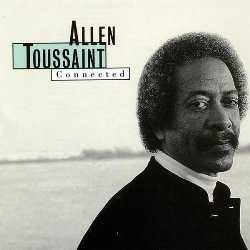 | Album: 7 of 16 Title: Connected Released: 1996-05-07 Tracks: 15 Duration: 1:01:53 Scroll: Up Down Top Bottom 25% 50% 75% Spotify AlbumCover | 1 Pure Uncut Love (04:02) 2 Do the Do (04:17) 3 Computer Lady (03:34) 4 Get Out My Life Woman (03:39) 5 Were All Connected (03:59) 6 Sweet Dreams (04:32) 7 Funky Bars (05:30) 8 Ahya (04:18) 9 If I Leave (04:06) 10 Aign Nyee (04:01) 11 In Your Love (05:37) 12 Oh My (02:53) 13 All of It (03:52) 14 Wrong Number (03:27) 15 Rolling With the Punches (04:06) |
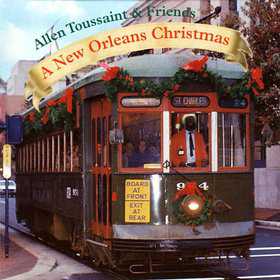 | Album: 8 of 16 Title: A New Orleans Christmas Released: 1997-09-09 Tracks: 13 Duration: 52:20 Scroll: Up Down Top Bottom 25% 50% 75% Allmusic AlbumCover | 1 Christmas This Year (05:31) 2 We Three Kings (04:21) 3 New Years Resolution (04:23) 4 Santas Second Line (04:15) 5 Silent Night, Holy Night (02:12) 6 Christmas Comes but Once a Year (02:53) 7 Christmas in New Orleans (04:11) 8 Jingle Bells (02:21) 9 O Holy Night (07:26) 10 The Christmas Song (03:46) 11 Winter Wonderland (01:31) 12 Do You Hear What I Hear (04:28) 13 Merry Christmas Baby (04:57) |
| A New Orleans Christmas : Allmusic album Review : Allen Toussaint is the epitome of the essence of New Orleans music; here he does Christmas songs with the two genres forming a perfect meld. We have some of the essentials -- "Silent Night, Holy Night," and "Winter Wonderland" (as done by Allen on solo piano), and "Jingle Bells" (with the New Birth Brass Band) -- and a few other standards done in non-sappy ways, along with several other not-so-familiar Christmas songs, all performed by the cream of New Orleans musicians. There are blues, Second Line, rhythm & blues, and jazz, all represented in a coherent manner, and newcomer Grace Darling acquits herself well. | ||
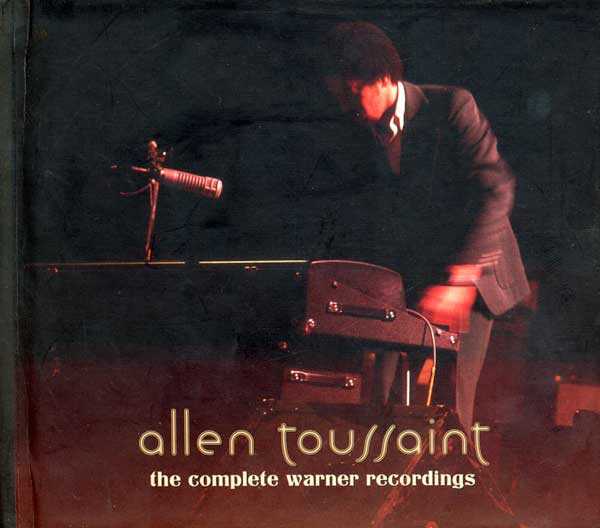 | Album: 9 of 16 Title: The Complete Warner Recordings Released: 2003 Tracks: 43 Duration: 2:38:12 Scroll: Up Down Top Bottom 25% 50% 75% Spotify Allmusic AlbumCover | 1 Victims of the Darkness (03:31) 2 Am I Expecting Too Much? (02:51) 3 My Baby Is the Real Thing (03:05) 4 Goin Down (02:59) 5 She Once Belonged to Me (02:52) 6 Out of the City (Into Country Life) (03:37) 7 Soul Sister (02:50) 8 Fingers and Toes (04:07) 9 Ive Got to Convince Myself (02:43) 10 On Your Way Down (04:01) 11 Gone Too Far (03:28) 12 Electricity (02:33) 13 Last Train (03:02) 14 Worldwide (02:43) 15 Back in Babys Arms (04:49) 16 Country John (04:46) 17 Basic Lady (02:59) 18 Southern Nights (03:37) 19 You Will Not Lose (03:42) 20 What Do You Want the Girl to Do? (03:40) 21 When the Partys Over (02:39) 22 Cruel Way to Go Down (03:53) 23 Country John (single version) (04:28) 1 Night People (04:21) 2 Just a Kiss Away (04:11) 3 With You in Mind (03:44) 4 Lover of Love (03:19) 5 To Be With You (03:25) 6 Motion (06:03) 7 Viva la Money (03:35) 8 Declaration of Love (04:42) 9 Happiness (03:26) 10 Optimism Blues (03:05) 11 Intro / High Life (live) (01:56) 12 Touch of Love (live) (03:09) 13 Brickyard Blues (live) (03:45) 14 What Is Success (live) (03:14) 15 Freedom for the Stallion (live) (03:25) 16 Last Train (live) (02:56) 17 Shoo-Ra (live) (03:29) 18 Allen and Gary Brown (live) (12:16) 19 Southern Nights (live) (04:17) 20 Allens Closing Remarks (live) (00:59) |
| The Complete Warner Recordings : Allmusic album Review : Allen Toussaint is a legend who wrote and produced some of the greatest songs in New Orleans R&B; history, but his career as a recording artist is hardly legendary. He didnt record all that much and what he did wax is overshadowed by his compositions and productions -- which, admittedly, is understandable given the work he did with the Meters, Lee Dorsey, Aaron Neville, Ernie K-Doe, the Band, LaBelle, Irma Thomas, and many others. But not being legendary is hardly the same thing as not having merit, and Rhino Handmades 2003 double-disc set The Complete Warner Recordings makes a convincing case that Toussaints three albums for Warner and Reprise are among the best hidden treasures in soul music. These three albums -- which are augmented by a very different single version of "Country John" and a full live concert originally released in part on Rhinos 1989 various-artists collection New Orleans Jazz & Heritage Festival, 1976 (although it apparently was recorded in Philadelphia in 1975), here presented in its entirety on the second disc -- represent the longest period of recording Toussaint had as a solo artist. He cut The Wild Sound of New Orleans by Tousan in 1958, at the peak of rock & roll and R&B;s chart success (this material is collected on Bear Familys The Complete "Tousan" Sessions), but throughout the 60s he devoted himself to behind-the-scenes work before getting the chance to record his own albums in the early 70s, starting with Toussaint (later retitled From a Whisper to a Scream for a U.K. reissue), cut for Scepter Records in 1970. He then moved to Warner, where he recorded three albums -- 1972s Life, Love and Faith, 1975s Southern Nights, 1978s Motion -- that largely went unheard outside of New Orleans R&B; and soul circles. Apart from a few import and quasi-legal budget-line reissues, these albums remained out of print for years, only surfacing as selections on the excellent 1991 CD The Allen Toussaint Collection, which expertly summarizes these records. Such is the neglect bestowed upon these three records; even in his otherwise fine liner notes for The Complete Warner Recordings, Billy Vera glosses over these albums, spending about a page on them and never going into detail. All this means is that the music needs to speak for itself, which it certainly can do. Toussaint did something very interesting with his Warner recordings. He stayed grounded in the earthy New Orleans R&B; and funk that had been his bread and butter for many a year, but he spun it differently, bringing it in line with the smooth soul coming out of places like Philadelphia in the 70s, tempering it with a bit of a gloss borrowed from Los Angeles troubadours, yet retaining that distinctly Southern feel. Each album shares that sound, with each song clearly identifiable as the work of Allen Toussaint, but each has its own feel. Life, Love and Faith is the strongest and funkiest of the bunch, a Southern soul spin on West Coast singer/songwriter albums that is an excellent expansion of his signature sound. Southern Nights is Toussaints album rock album, complete with a hazy theme and trippy instrumental interludes. Motion is his smooth commercial soul album, recorded with L.A. studio pros at Warners insistence. The live album finds Toussaint returning to the basics of his music, which is at once earthy and sophisticated. While each of the albums apart from Life, Love and Faith might have a flaw -- Southern Nights is a bit unfocused, Motion a bit too slick, the live material can meander -- these are minor issues since theres such a wealth of wonderful music here. Toussaint has an easy, relaxed touch to his performances that enhances the sly elegance of his writing, whether its on ballads like "With You in Mind" and the gorgeous "What Do You Want the Girl to Do?" or intricate funk like "Victims of the Darkness" and the dynamic, layered "Last Train," or such idiosyncratic spins on classic New Orleans R&B; like "Brickyard Blues" and "Shoo-Ra," the latter two taken from the live set. These are just a few of the many sublime moments on The Complete Warner Recordings -- moments so good, its hard to believe that these albums have gone underappreciated for so long. Since this set is limited to 2,500 copies and only available through www.rhinohandmade.com, this doesnt necessarily rectify the situation -- after all, thats hardly a wide distrubition (then again, as Paul Gayten quoted in Veras liner notes, "New Orleans music is the greatest in the world, but it just doesnt sell to the mass public") -- but anybody who loves soul music and New Orleans R&B; needs to own this priceless set. | ||
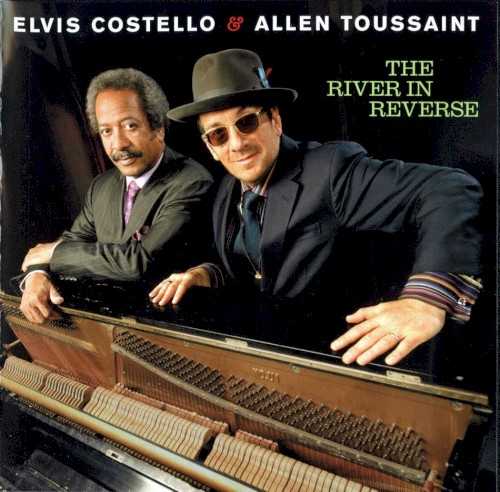 | Album: 10 of 16 Title: The River in Reverse Released: 2006-05-29 Tracks: 13 Duration: 53:04 Scroll: Up Down Top Bottom 25% 50% 75% Spotify Wikipedia Allmusic AlbumCover | 1 On Your Way Down (04:54) 2 Nearer to You (03:32) 3 The Sharpest Thorn (04:16) 4 Tears, Tears and More Tears (03:30) 5 Whos Gonna Help Brother Get Further? (05:04) 6 The River in Reverse (04:32) 1 Freedom for the Stallion (02:58) 2 Broken Promise Land (04:34) 3 Ascension Day (02:57) 4 International Echo (04:58) 5 All These Things (04:07) 6 Wonder Woman (03:08) 7 Six-Fingered Man (04:30) |
| The River in Reverse : Allmusic album Review : Its impossible to consider The River in Reverse without taking the devastation Hurricane Katrina wreaked upon New Orleans into account. Indeed, its quite likely that this collaboration between Elvis Costello and Allen Toussaint would not even have occurred if it werent for that cataclysmic event. Theyve collaborated before -- Toussaint wrote horn charts for Costellos 1989 album Spike -- but neither had plans to work together until they appeared together at several benefit concerts for the victims of Katrina in September of 2005. That kick-started the album that became The River in Reverse. Initially, the plan was for the collaboration to be a songbook album, with Costello and Toussaint performing some highlights from Allens rich songbook, and while the record bears some remnants of that blueprint -- seven of its 13 songs were written by Toussaint in the 60s and 70s -- the finished work evolved into an elegant, eloquent protest album crafted out of old songs and new. Costello alone wrote the title track, premiering at a benefit concert at Town Hall that September, and its angry account of the flood that wrecked New Orleans provides a touchstone for the other five new songs here, all co-written with Toussaint. "Broken Promise Land," "Ascension Day," and "International Echo" explore the aftermath of Katrina, while "Six-Fingered Man" is a funny acerbic take on a sinful sloth who is "always the first to blow his horn/His achievements multiply/Pity half of them seem to be lies." Toussaints presence on these five songs tempers but doesnt dilute the churning anger that roils underneath The River in Reverse: "Broken Promise Land" drives along on a swampy funk rhythm, the spare and laid-back "Ascension Day" is a showcase for Allens piano, "International Echo" revives the rolling spirit of classic New Orleans R&B, while "Six Finger Man" has a grinding, gritty blues backbeat. All five of these new songs are genuine collaborations, bearing the unmistakable stamp of both highly distinctive musicians, but the best compliment that can be paid to them is that they blend seamlessly with the classic Toussaint songs that comprise the rest of the record. When placed next to explicit songs of protest like "Broken Promise Land," such New Orleans R&B and soul staples as "On Your Way Down," "Tears, Tears and More Tears," "Freedom for the Stallion," and especially "Whos Gonna Help Brother Get Further" with its chorus of "What happen to the Liberty Bell, I heard so much about?/Did it really ding-dong?/It must have dinged wrong/It didnt ding long" take on an entirely different, politically charged meaning. This undercurrent of protest gives The River in Reverse thematic cohesion -- and as politically minded pop goes, it trumps such other 2006 albums as Neil Youngs Living with War, if only because it isnt so heavy-handed about its intentions -- but what makes the album rather extraordinary is that its as much celebration as it is protest. There is joy and tenderness within the performances of Toussaint, Costello, his backing band the Imposters, and Toussaint mainstays the Crescent City Horns, all captured by Joe Henrys clean yet warm production. If Costello pushes his phrasing a little harder than most interpreters of Toussaint -- not only does Allen himself have an easy, casual delivery, but so did such singers as Lee Dorsey, Aaron Neville, Ernie K-Doe, and Lowell George -- it suits the spirit of when the album was recorded, and Elvis is balanced about by the earthy, natural sound of the band, and Allens graceful harmonies. As pure music, this is impossible not to enjoy, and this rich blend of R&B, blues, soul, and funk illustrates exactly how important New Orleans is to Americas culture, and that it needs to be embraced in the wake of the disaster of Hurricane Katrina. Ultimately, the greatest achievement of The River in Reverse is that it, like the music of New Orleans itself, can not be pigeonholed or reduced to one specific thing. It can seem like a party, or it can seem like a bittersweet elegy, which is only appropriate for an album borne out of tragedy but created as a celebration. | ||
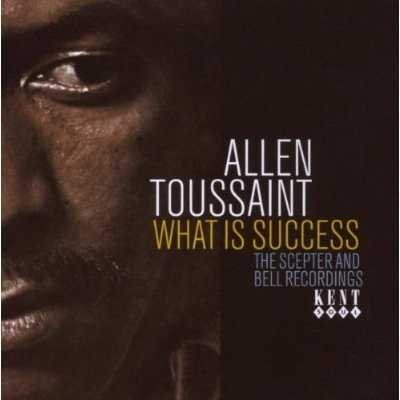 | Album: 11 of 16 Title: What Is Success. The Scepter and Bell Recordings Released: 2007-09-24 Tracks: 17 Duration: 55:03 Scroll: Up Down Top Bottom 25% 50% 75% AlbumCover | 1 Everything I Do Gonh Be Funky (03:09) 2 Get Out of My Life, Woman (03:10) 3 Sweet Touch of Love (03:18) 4 From a Whisper to a Scream (03:30) 5 Pickles (04:29) 6 Gotta Travel On (02:54) 7 The Chokin Kind (03:23) 8 Cast Your Fate to the Wind (03:20) 9 We the People (02:48) 10 Either (02:54) 11 Number Nine (03:30) 12 What Is Success (03:34) 13 Louie (03:03) 14 Working in the Coal Mine (03:11) 15 Ive Got That Feelin Now (02:52) 16 Tequila (03:11) 17 Hands Christianderson (02:47) |
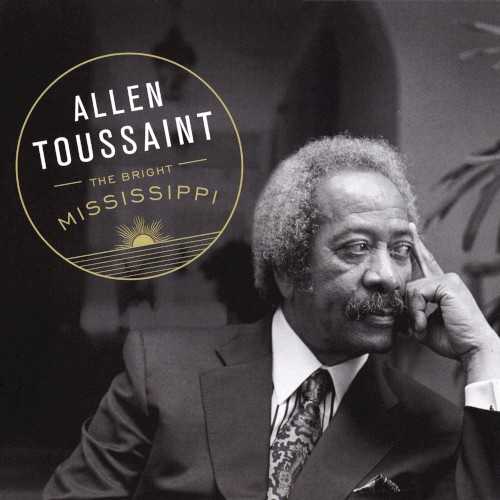 | Album: 12 of 16 Title: The Bright Mississippi Released: 2009-04-20 Tracks: 12 Duration: 1:01:31 Scroll: Up Down Top Bottom 25% 50% 75% Spotify TrackSamples Wikipedia Allmusic AlbumCover | 1 Egyptian Fantasy (04:39) 2 Dear Old Southland (06:19) 3 St. James Infirmary (03:51) 4 Singin the Blues (05:40) 5 Winin Boy Blues (06:41) 6 West End Blues (03:51) 7 Blue Drag (04:21) 8 Just a Closer Walk With Thee (05:10) 9 Bright Mississippi (05:07) 10 Day Dream (05:27) 11 Long, Long Journey (04:50) 12 Solitude (05:31) |
| The Bright Mississippi : Allmusic album Review : The Bright Mississippi stands alone among Allen Toussaint albums. Technically, it is not his first jazz album, for in 2005 he released Going Places on the small CD Baby-distributed Captivating Recording Technologies, a label run by his son Reginald, but for most intents and purposes -- and for most listeners -- The Bright Mississippi might as well be his first foray into jazz, since its the first to get a major-label production and release as its a de facto sequel to Toussaints successful, high-profile, 2006 duet album with Elvis Costello, The River in Reverse. Like that record, The Bright Mississippi is produced by Joe Henry, who has a knack for a sound thats clean yet soulful, one that lets the music breathe but still has heft to it. Henry teams Toussaint with a cast of heavy hitters -- including clarinetist Don Byron, trumpeter Nicholas Payton, guitarist Marc Ribot and, on a track a piece, pianist Brad Mehldau and saxophonist Joshua Redman -- to support the pianist on a run through jazz standards ranging from Duke Ellington and Django Reinhardt to Louis Armstrong and Thelonious Monk, whose 1963 classic provides the album its title. Everybody has a little bit where they shine, but this is thoroughly Toussaints showcase, a place where he can ease back and string together New Orleans jazz and R&B in his own elegant fashion. And what impresses most about Bright Mississippi is that although straight-out jazz is uncommon in Toussaints work, this neither feels unfamiliar or like a stretch. His signature runs and smooth grooves can be heard throughout the album, but the relaxed nature of the sessions makes it easier than ever to hear what an idiosyncratic, inventive instrumentalist he is, and that is a quality thats more evident upon repeated plays. Upon the first listen, The Bright Mississippi merely seems like a joyous good time, but subsequent spins focus attention on just how rich and multi-layered this wonderful music is. | ||
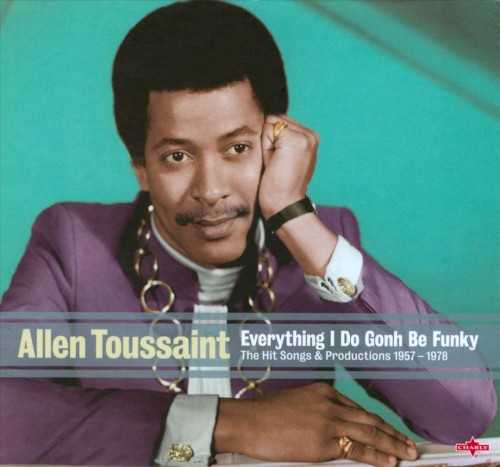 | Album: 13 of 16 Title: Everything I Do Gonh Be Funky: The Hit Songs & Productions 1957-1978 Released: 2011-02-28 Tracks: 50 Duration: 2:07:39 Scroll: Up Down Top Bottom 25% 50% 75% AlbumCover | 1 I Want You to Know (01:59) 2 Walkin’ With Mr. Lee (02:26) 3 Tic Toc (02:33) 4 Young Schoolgirl (01:55) 5 I’m Gonna Be a Wheel Someday (02:02) 6 Whirlaway (02:18) 7 Happy Times (02:07) 8 Java (01:53) 9 Wham Tousan (02:22) 10 Naomi (02:12) 11 Moo Moo (01:43) 12 Beverly Baby (02:31) 13 Heavenly Baby (02:30) 14 Tiddle Winks (02:26) 15 Whipped Cream (02:35) 16 Pie Crust (02:28) 17 Banana Split (01:34) 18 Fat Cat (02:07) 19 Young Man Old Man (02:55) 20 Poor Boy Got to Move (02:56) 21 Go Back Home (03:00) 22 Omar Khayyam (02:14) 23 Tomorrow (02:42) 24 Baby Do Liddle (01:42) 25 I Don’t Need One (02:18) 1 Ooh Poo Pah Doo, Parts 1 & 2 (04:25) 2 Over You (02:20) 3 Mother in Law (02:33) 4 A Certain Girl (02:44) 5 Fortune Teller (02:10) 6 Lipstick Traces (02:23) 7 Its Raining (02:02) 8 Wrong Number (02:48) 9 Ruler of My Heart (02:42) 10 I Like It Like That, Part 1 (01:56) 11 I Like It Like That, Part 2 (02:01) 12 All These Things (03:15) 13 Oogsey Moo (02:43) 14 It Will Stand (02:13) 15 Hot Tamales, Part 1 (02:39) 16 Hot Tamales, Part 2 (02:52) 17 Nearer to You (02:30) 18 I’m Evil Tonight (02:22) 19 Working in a Coal Mine (02:45) 20 Holy Cow (02:28) 21 Everything I Do Gohn Be Funky (From Now on) (03:09) 22 Sophisticated Cissy (02:50) 23 Look a Py Py (03:13) 24 Yes We Can (04:48) 25 Night People (04:20) |
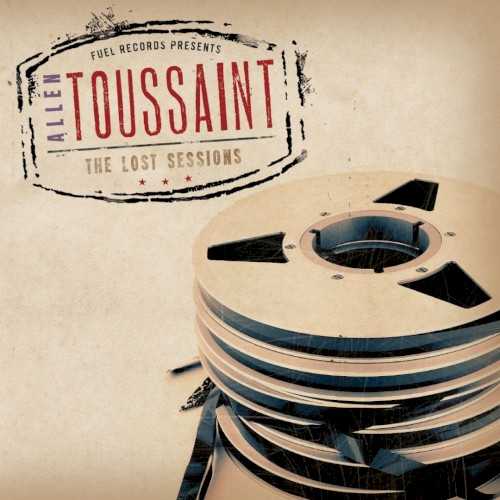 | Album: 14 of 16 Title: The Lost Sessions Released: 2011-04-19 Tracks: 16 Duration: 46:12 Scroll: Up Down Top Bottom 25% 50% 75% AlbumCover | 1 I Don’t Need No One (02:21) 2 Hercules (04:13) 3 Blues, Tears and Sorrow (03:05) 4 If You Love Her (02:30) 5 Omar Khayyam (02:17) 6 How to Pick a Winner (02:39) 7 Fairchild (03:24) 8 Hands Christianderson (02:49) 9 I Love You Still (03:37) 10 Man of the Street (03:24) 11 Gotta Travel On (02:55) 12 Here Comes the Hurt Again (02:34) 13 Get Out of My Life, Woman (02:23) 14 All I Want Is You (02:12) 15 Wait a Minute Baby (02:34) 16 Working in the Coal Mine (03:15) |
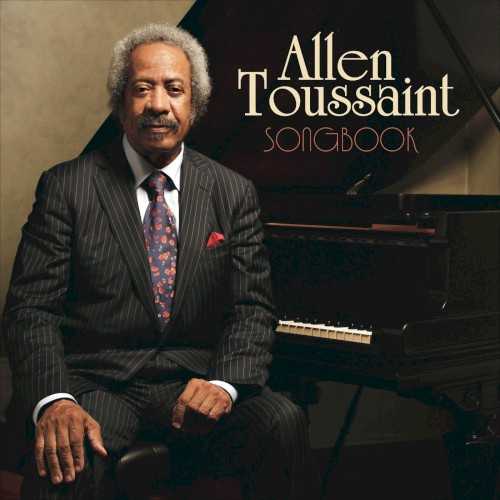 | Album: 15 of 16 Title: Songbook Released: 2013-09-24 Tracks: 16 Duration: 52:34 Scroll: Up Down Top Bottom 25% 50% 75% Spotify Allmusic AlbumCover | 1 Introduction (00:54) 2 Its Raining (03:57) 3 Lipstick Traces (01:59) 4 All These Things (03:42) 5 Allen Speaks (00:39) 6 Brickyard Blues (03:29) 7 Whos Gonna Help Brother Get Further? (04:09) 8 With You In Mind (03:31) 9 Holy Cow (03:01) 10 Introduction To Get Out of My Life Woman (00:11) 11 Get Out of My Life, Woman (03:01) 12 St. James Infirmary (02:23) 13 Soul Sister (02:41) 14 The Optimism Blues (02:51) 15 Its a New Orleans Thing (03:06) 16 Southern Nights (13:00) |
| Songbook : Allmusic album Review : Allen Toussaint experienced a late-career revival sparked, ironically enough, by the devastation of Hurricane Katrina in 2005. He had to leave his hometown New Orleans after the hurricane, relocating to New York City where he started to play regular gigs at Joes Pub and, soon enough, he cut The River in Reverse with Elvis Costello. That 2006 album propelled Toussaint toward a greater audience, leading to more headlining concerts, two of which are chronicled on Rounders 2013 release Songbook. Recorded in 2009 at Joes Pub, Songbook features nothing more than Toussaint alone at a piano running through songs hes written over the decades. He sprinkles in a New Orleans standard here and there -- theres an excellent rendition of "St. James Infirmary" -- but the spotlight is on his peerless originals, songs that are standards in their own right: "Lipstick Traces (On a Cigarette)," "Holy Cow," "Get Out of My Life, Woman," "Yes We Can," a medley of "A Certain Girl/Mother-in-Law/Fortune Teller," "Southern Nights." Toussaints voice sounds smooth and silky -- he in no way seems as if hes in his seventies -- and his piano is similarly nimble as it glides from signature New Orleans stride and boogie to sophisticated, elegiac chords. Perhaps this album packs no revelations -- there are no rearrangements, nothing unexpected in the songs -- but as an elegant summation of strengths, this Songbook is mighty attractive. | ||
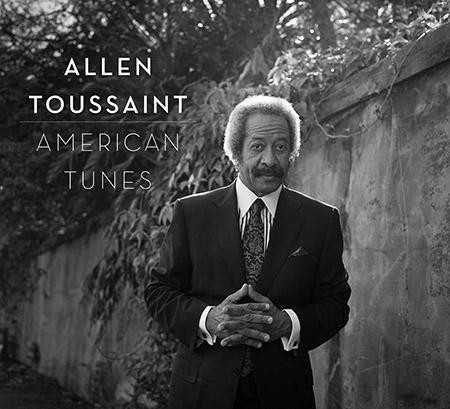 | Album: 16 of 16 Title: American Tunes Released: 2016-06-10 Tracks: 14 Duration: 51:29 Scroll: Up Down Top Bottom 25% 50% 75% Spotify Allmusic AlbumCover | 1 Delores’ Boyfriend (03:33) 2 Viper’s Drag (03:17) 3 Confessin’ (That I Love You) (02:52) 4 Mardi Gras in New Orleans (03:14) 5 Lotus Blossom (04:20) 6 Waltz for Debby (03:17) 7 Big Chief (02:14) 8 Rocks in My Bed (04:39) 9 Danza, Op. 33 (03:26) 10 Hey Little Girl (02:38) 11 Rosetta (04:10) 12 Come Sunday (05:12) 13 Southern Nights (03:32) 14 American Tune (04:59) |
| American Tunes : Allmusic album Review : So busy was Allen Toussaint in the wake of his late-2000s revival, he didnt wind up entering a recording studio to begin work on a sequel to his 2009 jazz album, The Bright Mississippi, until 2013 (2013s Songbook consisted of live recordings from 2009). A few solo sessions happened that year, followed by a round with a band and guests in October 2015 and then he died a few weeks later, passing away in Madrid, Spain while on tour. Producer Joe Henry, who helmed The Bright Mississippi, pulled together American Tunes for a posthumous release in the summer of 2016. Tonally, American Tunes isnt much different from its predecessor, yet its elegiac elegance doesnt come from a place of despair: its a wistful look back at his past and home. Where The Bright Mississippi focused firmly on jazz standards, American Tunes positions these prewar standards as just part of the fabric. Toussaint touches upon Big Easy standards, spinning "Mardis Gras in New Orleans" and "Big Chief" in a way that emphasizes their lyricism instead of rhythm, thereby drawing connections with the Bill Evans, classical, and Duke Ellington covers heard elsewhere on the record. Sometimes, the guests assert themselves -- Rhiannon Giddens commands attention when she sings Ellington -- but the presence of Charles Lloyd and Van Dyke Parks underscores the generous collaborative spirit within Toussaints music; even when hes heard alone here, hes playing with and commenting upon tradition. American Tunes concludes with Toussaint singing two modern pop standards: "Southern Nights," an original of his popularized by Glen Campbell, and Paul Simons "American Tune." Both function as revealing footnotes to the gorgeous instrumentals, underscoring his contribution to American popular song and how he found his own voice in the work of others. He was an American original, and American Tunes functions as a lovely coda to a legendary career. | ||